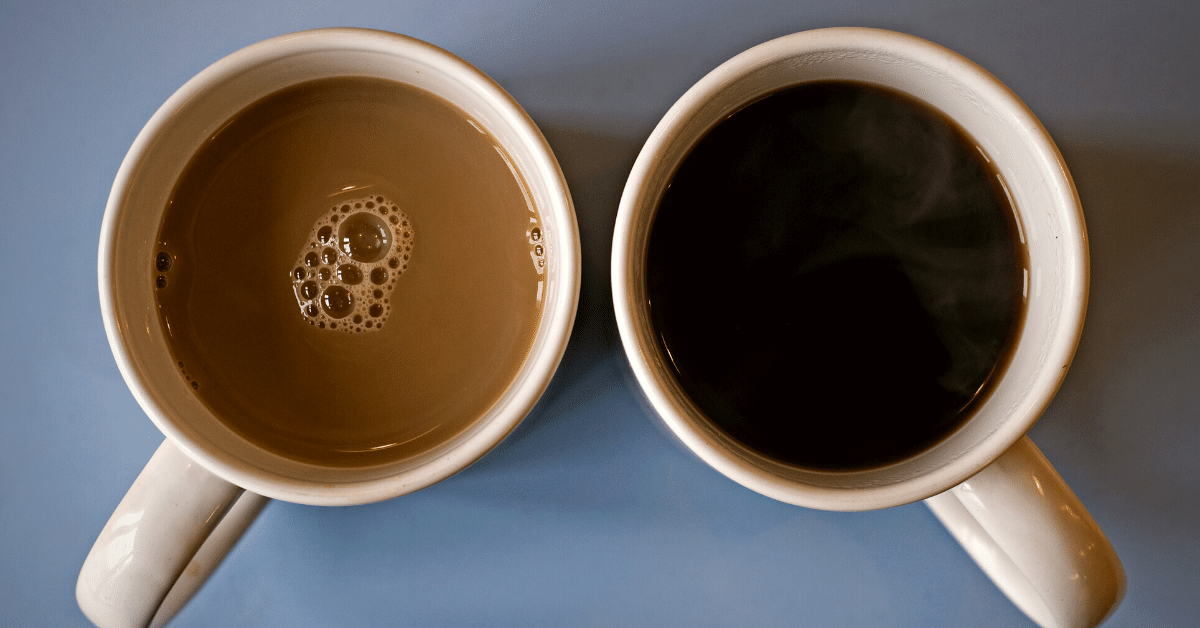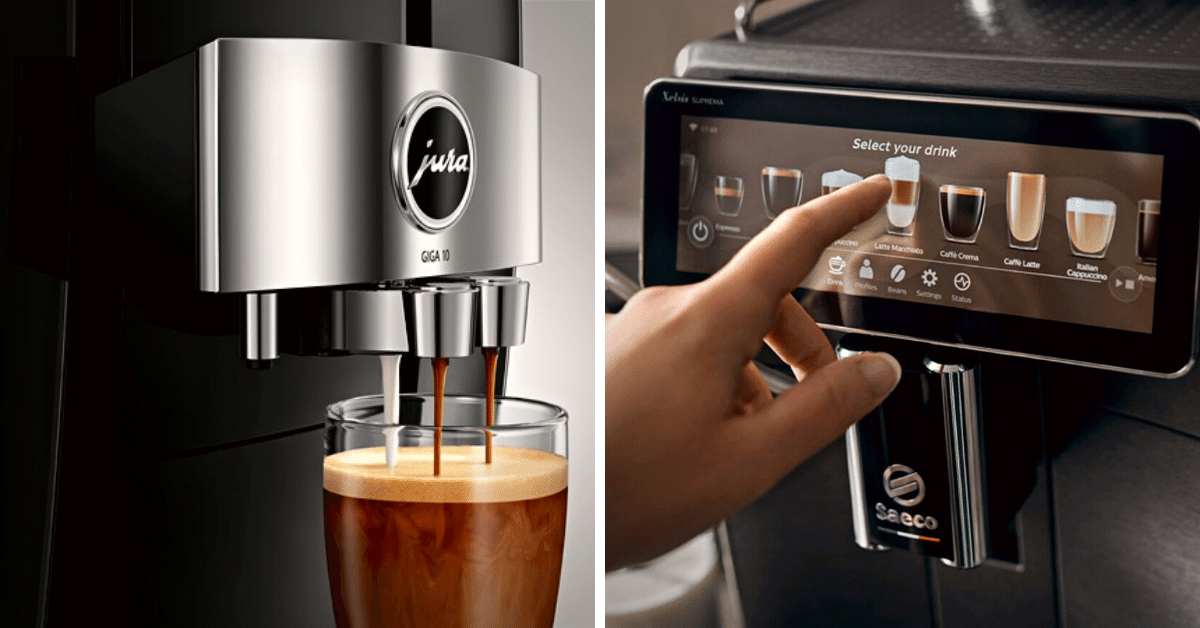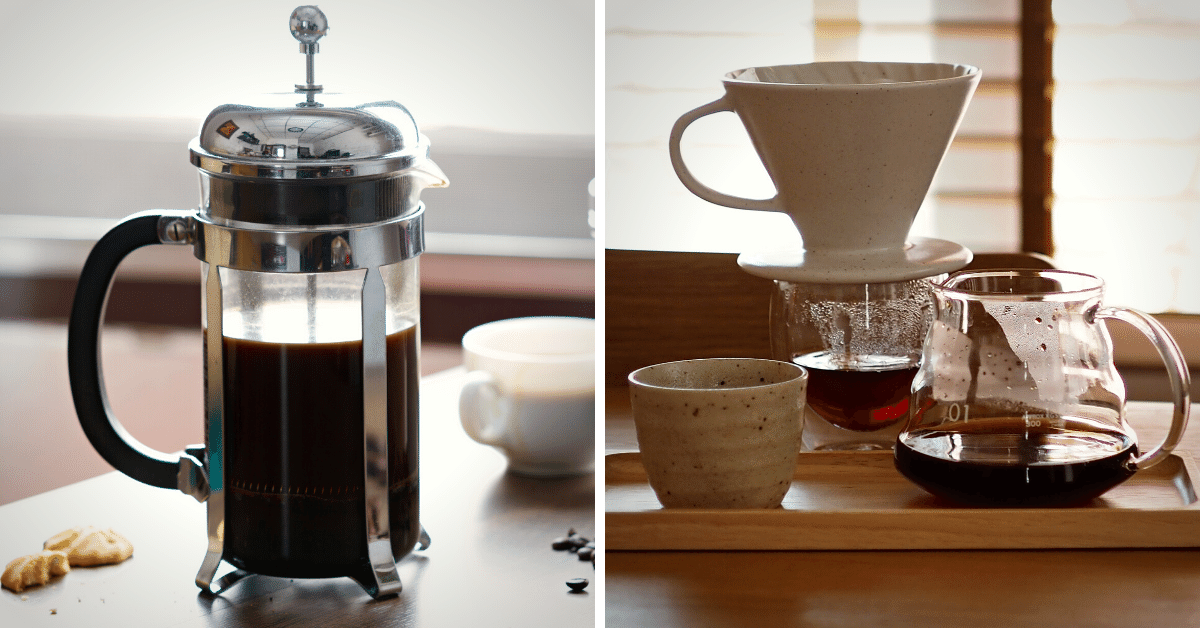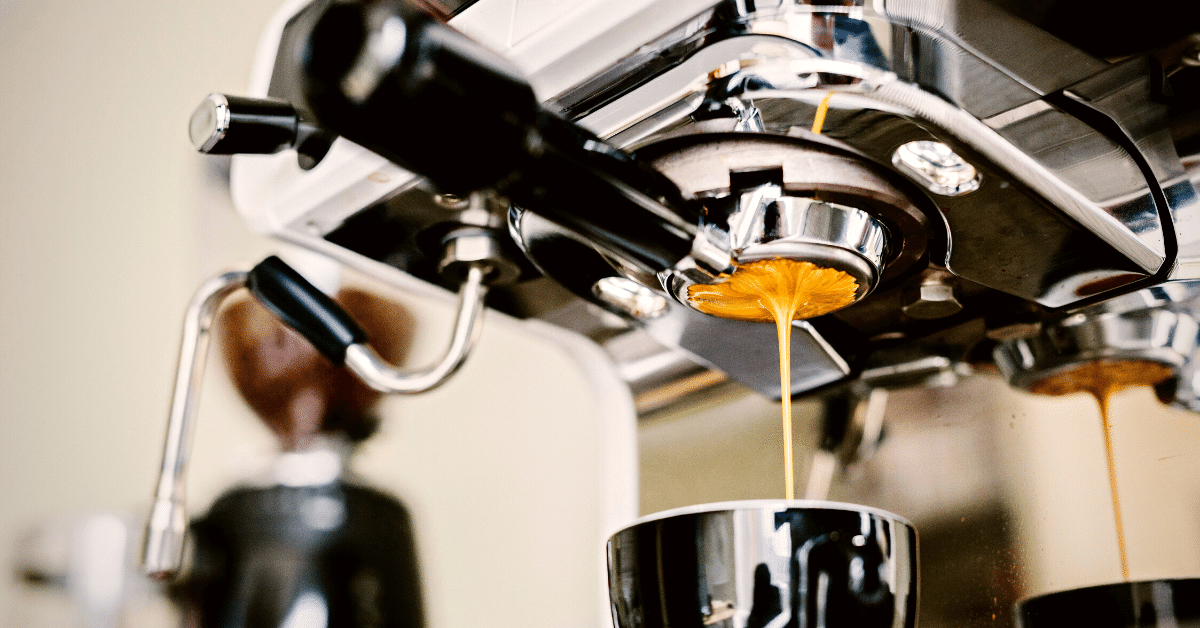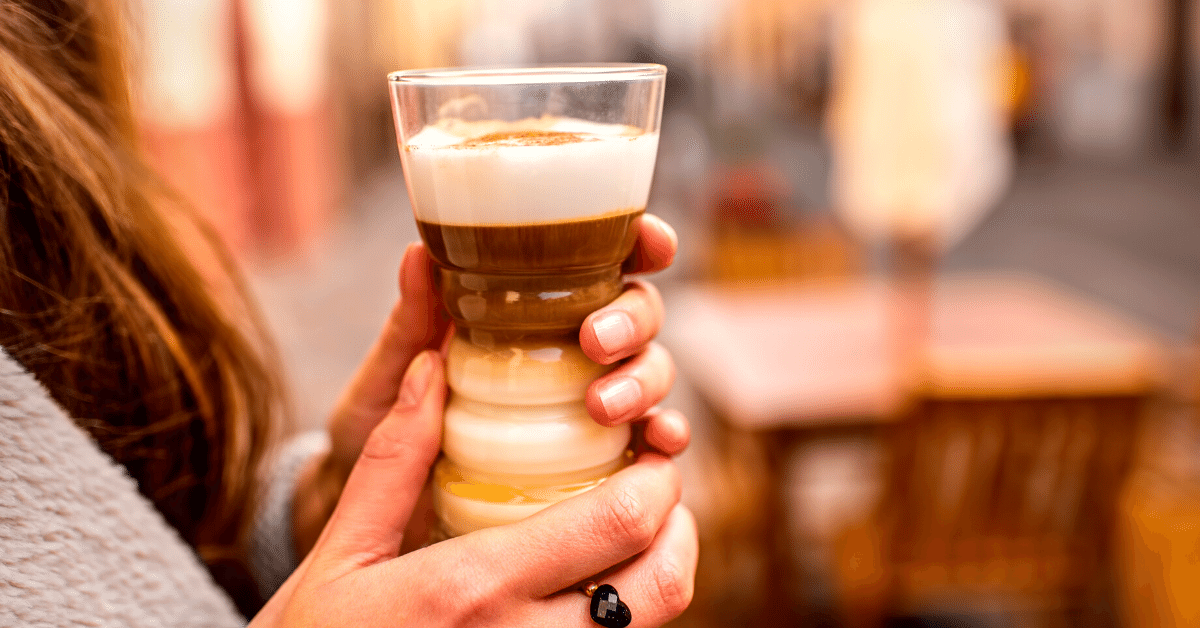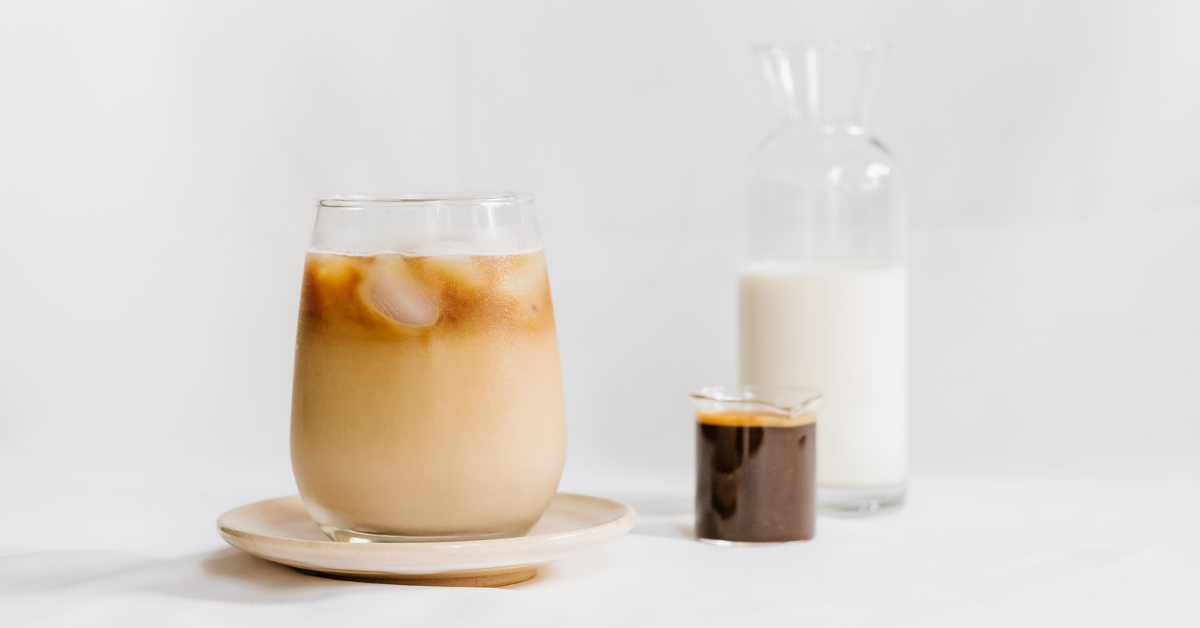Do you know black coffee vs white coffee difference? Check out what makes these coffees different and how to choose the right one for you.
With so many options available, ordering coffee is getting more and more difficult.
The difference is just in color, right?
Well, not quite.
It all comes down to roast, so let’s start from there.
Here’s the black coffee vs white coffee showdown.
What is Black Coffee
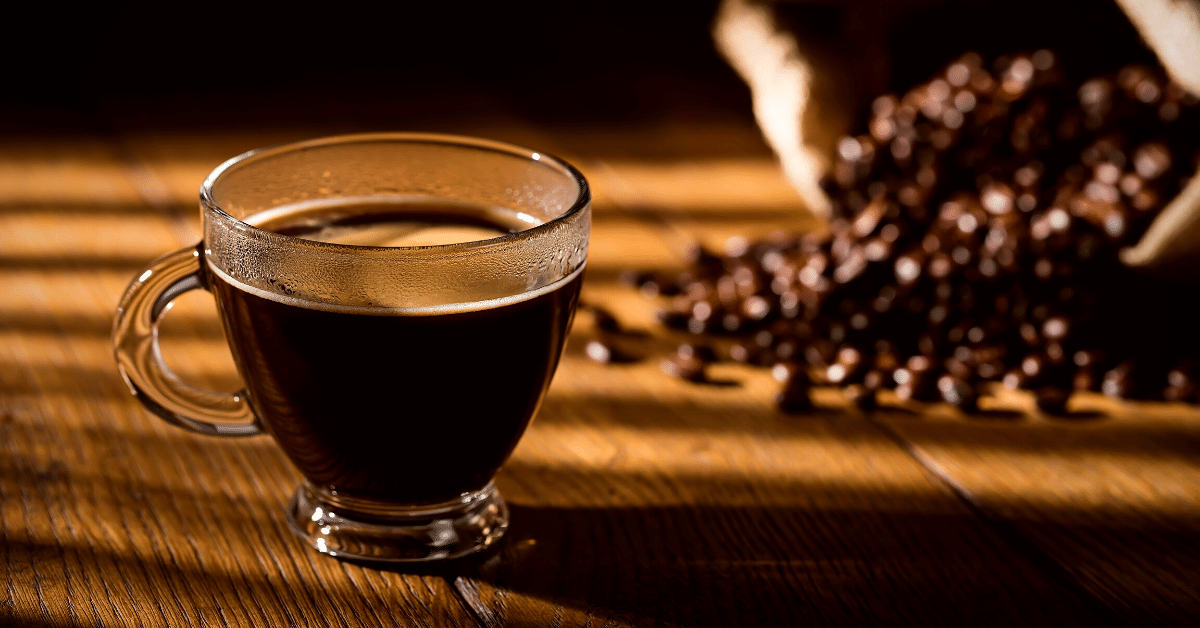
Okay, I know that the term “black coffee” is widely used to define regular coffee without milk or creamer. But that’s not what we’re talking about here.
Today, it’s all about beans.
In that case, black coffee refers to dark-roasted coffee beans.
Dark roast coffee has that rich flavor with decadent dark chocolate notes and slight bitterness. And it’s that unique flavor combination that gives off the “intense” vibe.
But while caffeinated, black coffee isn’t actually the strongest. This brings us to the star of the show, which is…
What is White Coffee
Again, we’re talking about the white coffee bean, not the coffee drink.
As you know, coffee beans are actually green in color when they’re first picked. They get that familiar brown hue after being roasted.
But not all coffee is processed the same.
In the case of white coffee, the roasting process is only done halfway. And not just that, but the temperature used is much lower.
As a result, coffee beans turn into a very light beige color.
Technically speaking, white coffee is considered a light roast. But it’s the first one on the spectrum, right after unroasted green beans.
However, white coffee hits the perfect spot. The roasting process allows those nutty and floral flavors to come to light without any bitterness. But while it doesn’t feel “strong,” white coffee is a bit more caffeinated than your regular black java.
Black Coffee vs White Coffee: The Difference
Now, these two types of coffee have many other dissimilarities aside from their color. In this section, we’ll go over each of them individually.
Roasting time and temperature
As we already established, white coffee is roasted for a much shorter time compared to black coffee.
Green coffee beans are roasted anywhere from 7 to 20 minutes. For the white coffee bean, roasting time should be kept at a minimum. On the other hand, the black coffee bean is roasted for about 15 minutes or more.
But it’s not just about the length of the roasting process. The temperature matters as well.
Now, the temperature steadily increases during roasting. And at two certain points, chemical reactions known as “cracks” occur.
The name for the reaction is pretty fitting, actually. You see, coffee beans physically crack once they reach these temperature points:
- 384 degrees
- 435 degrees
The sound is similar to what popcorn makes.
The first crack is when the beans start releasing moisture from the inside. After the second crack, they also start releasing oils.
Typically, a light roast is achieved by stopping the process right after the first crack. But for white coffee, you pull the beans before that happens, around 325 degrees.
At this point in the process, only acids and sugars were extracted. That’s why white coffee tastes crisp and sweet.
If you leave the beans to roast for longer and at higher temperatures, other compounds will extract as well. For black coffee, you want to pull the beans at some point between 450 and 480 degrees.
This means that they have already cracked for the second time. The oils are released, which give coffee more body and bitterness.
IN A NUTSHELL
White coffee is roasted until it reaches 325 degrees before the first crack. Black coffee, on the other hand, is roasted all the way until about 480 degrees.
The difference in bean appearance
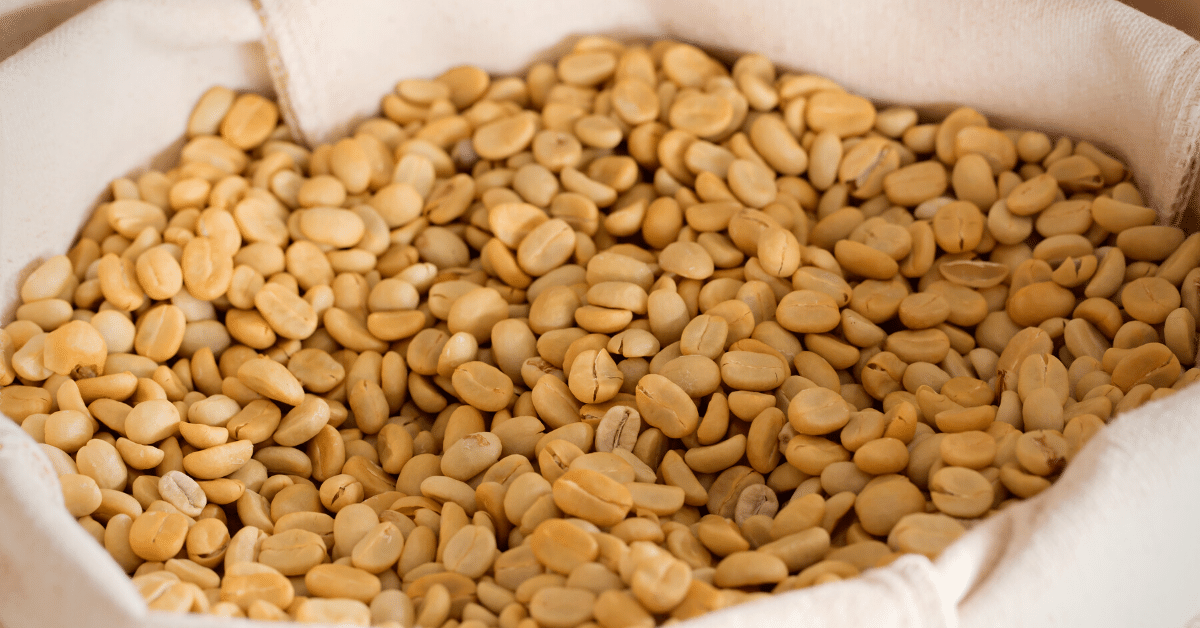
There’s absolutely no way you can mix up white and black coffee. Well, unless you’re brewing in total darkness.
White coffee isn’t actually white – but it’s very pale. Black coffee, on the other hand, has more of a dark brown color with a red hue.
But this is not where the differences in appearance end.
Remember how I said that coffee beans start releasing moisture after the first crack?
Well, after the moisture evaporates, the beans become porous and lose some mass. And after the second crack, they also become oily.
But while that’s the case with black coffee, white coffee beans don’t look like that. They’re pulled before the first crack, so they’re still dense and hard.
IN A NUTSHELL
White coffee beans are very pale and dense. Black coffee beans, on the other hand, are dark brown in color and porous.
How they taste
Coffee beans contain numerous compounds responsible for the flavor, such as:
- Sugars
- Acids
- Oils
Now, these compounds break down at different times during the roasting process.
At around 302 degrees, sugars start to caramelize way before the first crack. That’s why white coffee beans have prominent sweetness and nutty notes.
But as you know, if you leave caramel too long on the stove, it will get burnt. Above about 350 degrees, it begins to develop a bitter, burnt taste.
That’s why black coffee has that slight bitterness to it. At this point, it also develops a deep, smoky flavor.
Finally, oils give coffee more body. Oils get released after the second crack. Since black coffee beans are pulled after that, they get some of those oils. This makes them richer in texture compared to white coffee.
IN A NUTSHELL
White coffee has a light body and nutty flavor without any bitterness to it. Black coffee, on the other hand, is rich and slightly bitter, with prominent smoky and chocolate notes.
Acidity and bitterness
When we talk about coffee acidity, we’re not talking about the actual pH level.
Instead, coffee acidity refers to that pleasant sharpness you feel toward the front of the mouth. Acidity gives coffee that brightness that balances out the flavor.
So, what gives coffee acidity?
Well, acids, of course.
Coffee contains acids such as:
- Citric
- Acetic
- Quinic
- Malic
- Chlorogenic
Citric, acetic, and malic acids are considered organic, and they’re responsible for that tart flavor. Quinic and chlorogenic, on the other hand, are secondary acids, and they cause bitterness.
Organic acids already exist in coffee beans. However, their concentration decreases during the roasting process. This is why white coffee has a brighter flavor compared to black coffee.
As for the secondary acids, they’re formed during the roasting process due to chemical changes that occur. This happens later in the process, which is why white coffee doesn’t have any bitterness to it.
IN A NUTSHELL
Due to high concentrations of acids, white coffee has that tartness that black coffee lacks. On the other hand, black coffee is slightly bitter due to the formation of secondary acids.
Caffeine content
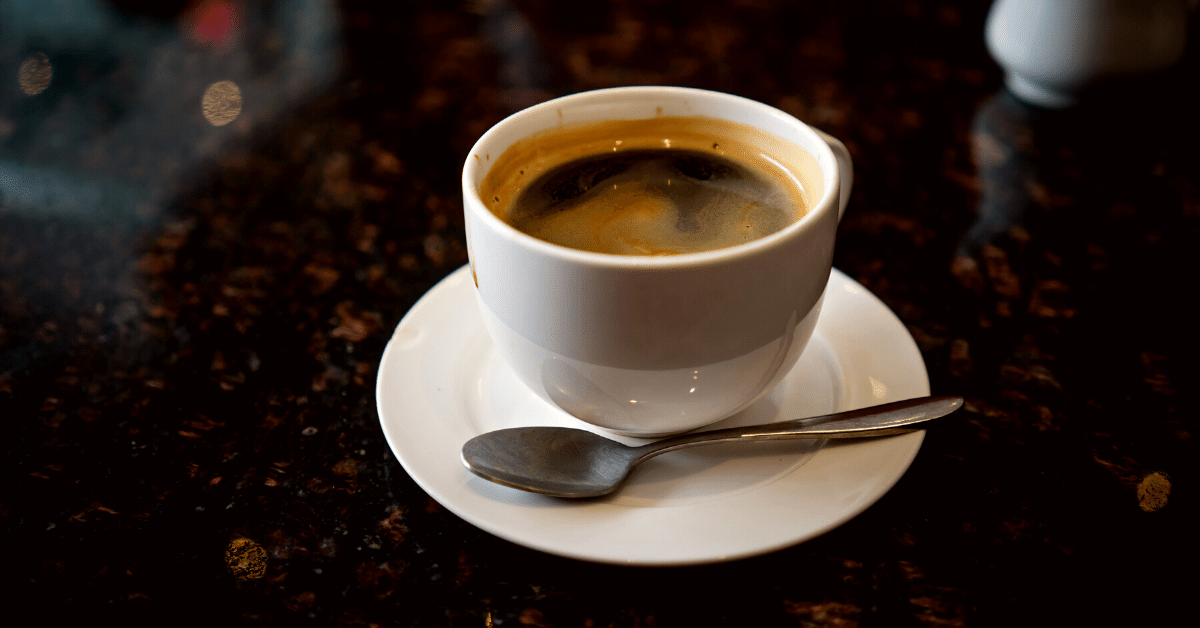
Caffeine is another compound that decreases in concentration when exposed to high temperatures.
This means that white bean has more caffeine than black.
But how much more?
You’ll see many brands claiming that their white coffee contains up to 50% caffeine compared to dark-roasted coffee.
Let me tell you right away – that’s a bunch of mambo jumbo.
In reality, there’s about 5% more caffeine in white coffee compared to its black counterpart.
And to be honest, you’ll hardly feel the difference. Well, unless you’re drinking a gallon of coffee a day.
IN A NUTSHELL
White coffee has slightly more caffeine compared to black coffee. However, the difference is pretty insignificant for a moderate coffee drinker.
Versatility
As I already said, white coffee beans are denser and less porous than those roasted at a dark level.
This makes them quite harder to grind. In fact, if you don’t own a commercial-grade grinder, give up doing that at home. It’s much better to simply buy ground white coffee from a coffee shop.
Dense coffee beans are ground into dense coffee grounds. This means they’re not as easy to extract as black-ground coffee.
Basically, they need a little push. In other words, you should use pressure. The best way to make coffee with white coffee is to use an espresso machine.
When it comes to black coffee, it’s a perfect all-rounder. You can use it for pretty much any brewing method, be it a drip coffee maker or an Aeropress.
IN A NUTSHELL
Since white coffee grounds are dense, they need pressurized hot water to extract properly. That’s why they’re ideal for making espresso. Black coffee grounds, on the other hand, work for pretty much any method you want.
The texture

Oils are the compound most responsible for coffee’s body.
What is a coffee’s body, anyway?
To put it simply, it’s the texture of the drink. Think about the difference between tea and whole milk. Tea is rather light, just like water. Milk, on the other hand, leaves that feeling of fullness in your mouth.
Well, black coffee is kind of like milk in this case. Compounds like oils and fiber give it a thicker texture which has a certain “weight” while you’re drinking it.
White coffee isn’t exactly like water or tea. Almond milk is the closest it comes to its texture.
IN A NUTSHELL
When brewed, white coffee has a thin texture. Black coffee, on the other hand, has a richer mouthfeel.
FAQ
Have other questions related to black or white coffee? In this section, I’ll answer whatever you might be wondering about.
Which is healthier black or white coffee?
Generally, both white and black coffee is healthy. But black coffee has lower acidity, which means it’s gentle on your digestive system. It also contains less caffeine, which can cause jitters, increased heart rate, and nausea.
Is white coffee easier on your stomach?
White coffee has a lighter flavor profile, but it’s higher in acidity and caffeine compared to black coffee. Now, your stomach can be sensitive to both of them, causing it to produce more gastric acid. This can cause discomfort and digestive issues.
Does white coffee stain teeth?
Coffee contains ingredients called tannins, which stain your teeth. While white coffee has fewer tannins than black coffee, heavy consumption will cause teeth yellowing.
To Sum Things Up
The difference between black and white coffee lies in the length and temperature of the roast.
Because it’s roasted for shorter, white coffee is light and bright. It’s sweet and without any bitterness – perfect for espresso.
Black coffee, on the other hand, is roasted for a longer time. That’s why it has a rich and earthy flavor profile.
What is blonde coffee? Here’s our in-depth article covering everything about this type of roast.

